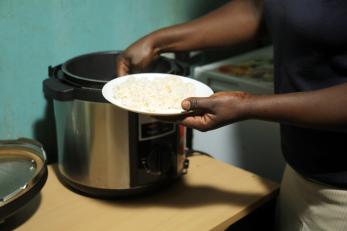Cooking in displacement settings
Engaging the private sector in non-wood-based fuel supply

New research from Energy 4 Impact for the Moving Energy Initiative argues that the private-sector can be part of the solution to providing clean-burning, fuel efficient stoves in displacement settings.
Refugees generally have limited access to modern cooking solutions and most either depend on insufficient humanitarian agency handouts of ‘in-kind’ firewood or have to travel long distances to collect firewood. In many displacement settings, a crisis point is being reached in which firewood from the local environment is no longer available and no alternatives exist. People living in and around refugee camps and settlements often have little income, and the remote nature of these settings limits access to more modern energy products and services. At the same time, people in these settings are engaging in markets and using what little income they have to purchase traditional fuels for cooking.
Within this context, the Moving Energy Initiative (MEI) set out to investigate innovative models that could be used to scale up the distribution and consumption of non-wood cooking fuels, focusing in particular on the Kakuma refugee camp in north-west Kenya. This was done by presenting the private-sector with the challenge of designing a non-wood cooking concession under which the price of a more modern cooking solution would be capped at an amount determined as affordable to a large percentage of the population in Kakuma.
Cooking in Displacement Settings – Engaging the Private Sector in Non-wood-based Fuel Supply, a new report by Energy 4 Impact for the Moving Energy Initiative, presents the findings from that process, as well as background information on the cooking situation in Kakuma. It examines the challenges for refugees in accessing modern cooking solutions, and for those supporting or seeking to improve cooking practices among refugee populations and host communities.
Recommendations
Based on the lessons learnt from the concession competition and from interviews with various stakeholders who are engaged in efforts to develop market-based approaches to providing alternative cooking solutions for refugees, the report proposes several recommendations including:
- Greater donor investment and longer-term guaranteed funding for cooking interventions in displacement settings
- Cooking interventions should respond to users’ preferences and, where possible, build on refugees’ and local communities’ willingness to pay
- Cooking interventions should build on existing local markets and integrate existing supply chains into their distribution arrangements where possible